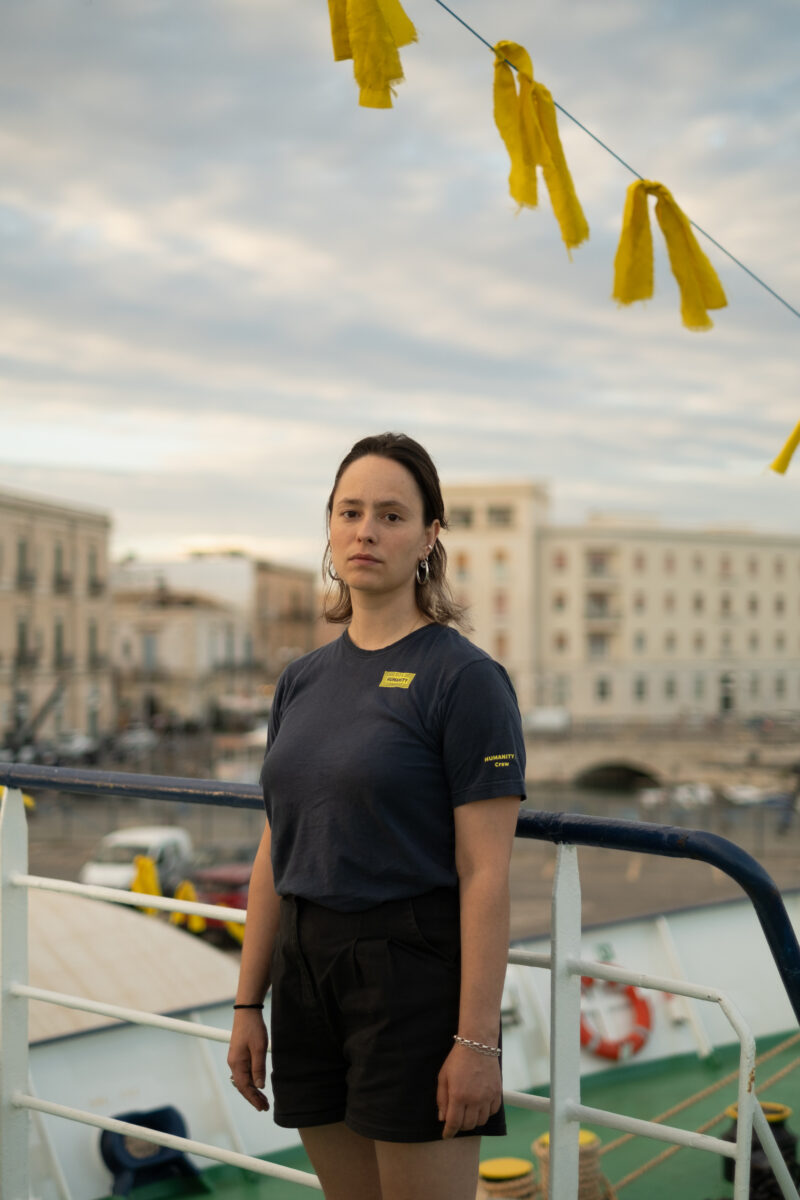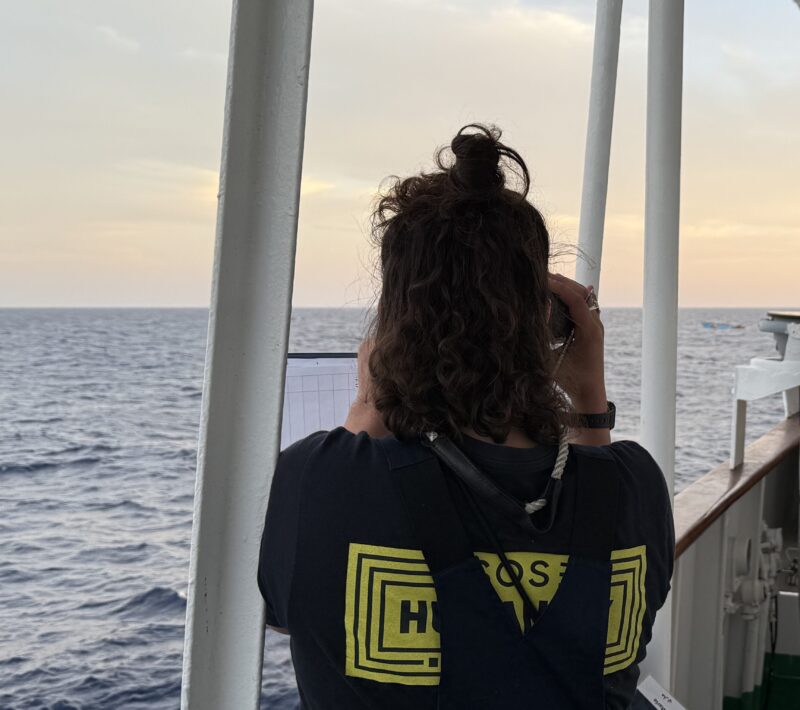Interview: Why bearing witness is essential

With the organisation’s ten years of experience SOS Humanity does not want to limit its activities to search and rescue. The organisation defined testifying as one of the main goals of the organisation. Marie Michel, Human Rights Observer (HRO) on board Humanity 1, talks about her work and explains why documenting and visualising the stories of the survivors is also crucial.
What does the HRO tasks involve?
The human rights observer is responsible for documenting the human rights and international maritime law violations by collecting, storing and processing evidence in the form of VHF-calls, screenshots, e-mail communication and photos. For each rescue operation but also other forms of incidents we witness, SOS Humanity compiles a report in which the event is reconstructed in detail, and which is sent to the authorities.

Why is this so important?
Without the presence of non-governmental, humanitarian actors at sea, international law violations, happening in the Central Mediterranean and human rights violations that people on the move experience, would happen unseen and untalked about. To bring about change regarding the political and humanitarian catastrophe in the Central Mediterranean, bearing witness to these rights violations and testifying to the stories and experiences of survivors who have fled from Libya and Tunisia is crucial.
What exactly does bearing witness mean?
Bearing witness means documenting the experiences of survivors, multiplying their voices and demands. In the media, we are since years constantly confronted with figures and numbers of arrivals, deaths and pull-backs. We try to make sure that we never forget the personal stories and individuals behind these numbers. Bearing witness, however, also means showing and quantifying the systematic law violations by European, Libyan and Tunisian state actors and using this evidence for our political and legal work on land to hold the respective authorities responsible.
What are the main violations the crew is witnessing on board Humanity 1 during the missions at sea?
What we witness on board the Humanity 1 includes a range of rights violations which can be classified into indirect and direct rights violations committed by the European Union and its member states.
By externalizing search and rescue activities to Tunisia and Libya since 2017 the EU and its member states have more and more refrained from their responsibility for search and rescue by outsourcing this responsibility to countries which are no places of safety for people rescued from distress and to actors who are responsible for the worst kind of human rights violations such as sexualized violence, torture, arbitrary detentions and refoulements. Survivors on board Humanity 1 departing from Libya often show signs of torture. We have already witnessed ourselves at sea how the so-called Libyan Coast Guard fired gunshots into the water while people were in the water. Also, the Tunisian Coast Guard uses violence against people in distress at sea, engaging in dangerous maneuvers which already brought boats to capsize and using tear gas. Very much aware of these rights violations, the EU and its member states still support these illegal pull-backs and actors who should be treated like criminals instead of making deals with them.
Although the responsibility of Malta and Italy having drastically decreased on paper – due to the establishment of the Libyan SRR in 2018 and the Tunisian SRR in 2024, we still very much witness that even in their comparably small search and rescue zone distress cases are not thoroughly coordinated: Malta never reacts to our calls and never refers distress cases to us but cooperates with the so-called Libyan Coast Guard enhancing illegal pull-backs. Italian authorities very often also delay rescue operations in crucial situation of life and deaths. Just last year, a person died at night while two patrol vessels of the Italian Cost Guard and the Humanity 1 were at scene because the Italian Coast Guard decided to delay the rescue to the early morning hours. Until today we do not know why the rescue operation was delayed and whether this life could have been saved.
On the central Mediterranean, the European Union and its member states seem to throw their international law and human rights commitments literally overboard engaging in a game of responsibility shifting.
Can you see any trends developing in the Central Mediterranean over the past ten years?
What we have witnessed since 2015 is a manifestation of a policy developing in 2015/2016 of leaving people to die, so not providing enough rescue capacities for saving lives at sea and not adhering to the duty to rescue. Sadly, this cannot be described as a “trend” anymore but is already a set policy and practice.
What we witness since 2017 and is nowadays at the forefront of debates everywhere in Europe is the trend of externalisation. The Central Mediterranean seems to have been a laboratory for the strategy to outsourcing border control and migration policies to third countries where human rights are not secured and especially migrants and refugees are not safe.
Lastly, we see a still increasingly humanitarian shrinking space. Search and rescue organisations have faced challenges and obstruction since the beginning of their operations, but the systematic obstruction of SAR has reached another level with the Piantedosi law and the practice of distant ports in Italy. Also, criminalisation of humanitarian aid is more and more provided for in European legislation, such as in Italy and Germany and is currently negotiated on European level with the so-called Facilitator’s Package.
How is it possible that the Central Mediterranean is increasingly becoming a place of massive human rights violations?
We witness a shift away from the European and international human rights system and from the rule of law. Flight from the global South is highly focused and exaggerated in European political discourse. People seeking protection from war, hunger, torture and poverty are being instrumentalised as scapegoats for various drawbacks in our society. This is clearly being fuelled by rights-extremist actors but has arrived at the core of our societies. Recently democratic parties not only engage in these rights violations but openly claim that human rights such as the right to asylum shouldn’t be granted to all human beings in the same manner. The democratic room for debate in our societies dramatically shifted to narratives formerly only known by rights-extremist actors characterized by Inhumanity, misanthropy and racism. This should be absolutely alarming to all of us!









